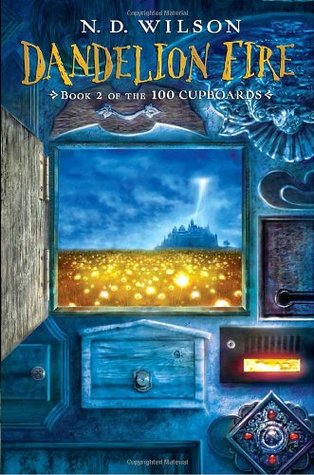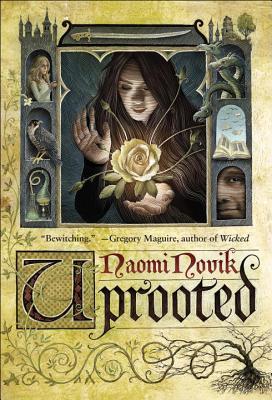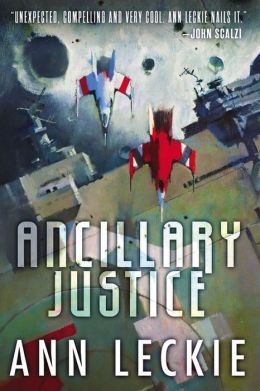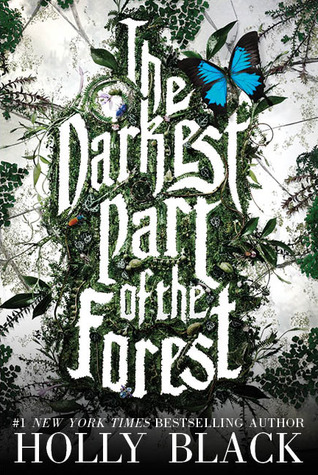100 Cupboards takes place in Kansas, and hints at other places that can be reached through the magical cupboards in Henry's bedroom wall. Dandelion Fire awakens our hero's magical potential and sends him through the cupboards on a quest to find his family and foil a wizard.
I loved the magic; loved how it was brought to life, loved the dangers and limitations of it, loved how Henry had to figure it out as he went along. Absolutely loved how dandelions worked as metaphors for Henry's particular strengths.
Younger cousin Henrietta gets more of a starring role, and I love Henrietta, with all her annoying, bossy, bull-headed bravado. The story gets more epic because Henry and Henrietta each have their own quests, as does uncle Frank (yay Frank!). Henry's friend Zeke is back, too. The narration follows everyone in turn as they lose each other and wander around several new fantasy landscapes (not 100, though!) meeting a whole cast of new characters. I loved the faeren; very funny.
I wasn't particularly enthralled by the villain of Dandelion Fire, but I can't tell you why without giving things away. And . . . nope, can't actually say anything more about him. But nonetheless there's lots of tension and the stakes get very high. It's a darker, more mature book than 100 Cupboards; HP and the Half-Blood Prince compared to Prisoner of Azkaban. Great climactic fight scene; everyone gets their hero moment.
 The Chestnut King is an intense, page-turning conclusion, even darker and scarier. Henry now knows who he is and has so much more to lose. I loved the family dynamics and Henry's developing relationships with the new characters introduced in Dandelion. There's more magic—I loved the ingenious things Henry figures out how to do with it. More dandelions. Frank Fat-Fairy is a great character with his own little arc (yay Frank!*); I also liked the Chestnut King: he's an interesting new twist to the story, but grounded in old myths so it doesn't feel like he came out of nowhere. The villain is suitably creepy and nasty (and weird). (The scar on Henry's chin is one of the most disturbing things I've ever read about. And those minions: eeww!)
The Chestnut King is an intense, page-turning conclusion, even darker and scarier. Henry now knows who he is and has so much more to lose. I loved the family dynamics and Henry's developing relationships with the new characters introduced in Dandelion. There's more magic—I loved the ingenious things Henry figures out how to do with it. More dandelions. Frank Fat-Fairy is a great character with his own little arc (yay Frank!*); I also liked the Chestnut King: he's an interesting new twist to the story, but grounded in old myths so it doesn't feel like he came out of nowhere. The villain is suitably creepy and nasty (and weird). (The scar on Henry's chin is one of the most disturbing things I've ever read about. And those minions: eeww!)When fantasies get as epic as this**, with so many characters and plot threads, they often get a little bit out of hand, and I will say the ending felt a little tangled—almost anticlimactic. But that's just a pacing quibble, and character-wise, theme-wise, plot-wise the big battle was intense and satisfying. I loved the denouement and epilogue; very fitting. (Since I'm quibbling, I will say that there were a few minor unresolved matters that bugged me a bit.***)
Wilson can write. His sentences are lovely; his characters are complex, messy individuals who grab you and make you love them; his fantasy world is magical and worth returning to. When I saw the first book of his Ashtown Burials series at my library I snapped it up. I think he may become an auto-buy author.
I wouldn't necessarily say that books 2 and 3 are middle-grade; I noticed a lot of reviews saying they were confusing and hard to follow (I didn't think so at all, but I'm not ten), and there were some pretty scary bits, so I suppose it depends on the reader.
I'm trying to think of a food equivalent to the brilliant dandelion magic that infuses these two books (and no, dandelion salad is not the answer!). Something simple, common, but completely transcendent. Sun-warmed, perfectly ripe berries (whatever's in season: there are a few late strawberries in my garden right now), picked and eaten one at a time to savour that burst of sour-edged sweetness on the tongue.
* Um, so I'm sure Wilson is doing something symbolic with all these repeated names; maybe I'll figure it out next time I read it! (Also, some reviewers mentioned overt Christian symbolism, which I have to admit went right over my head (and I'm a Christian!).)
** Okay, we're not talking Wheel of Time or anything, but for a supposed middle-grade fantasy things are pretty polyphonic.
*** Spoiler alert:









